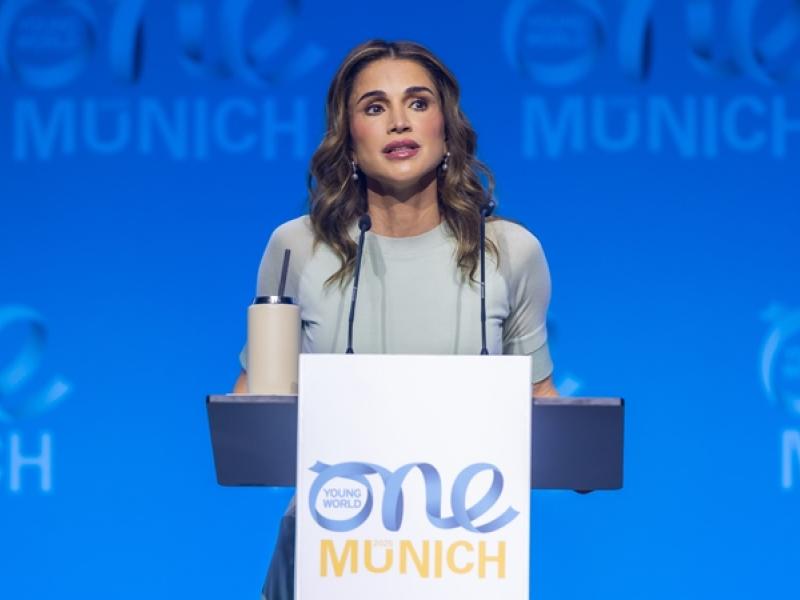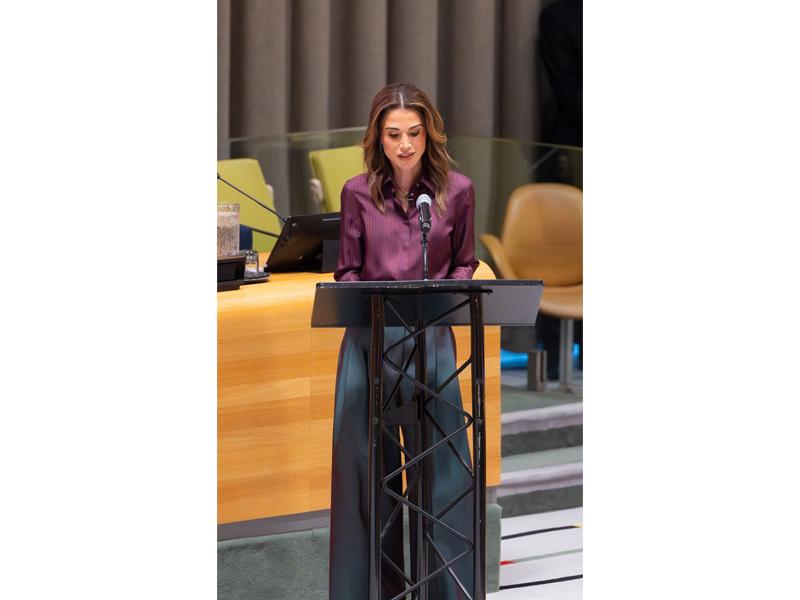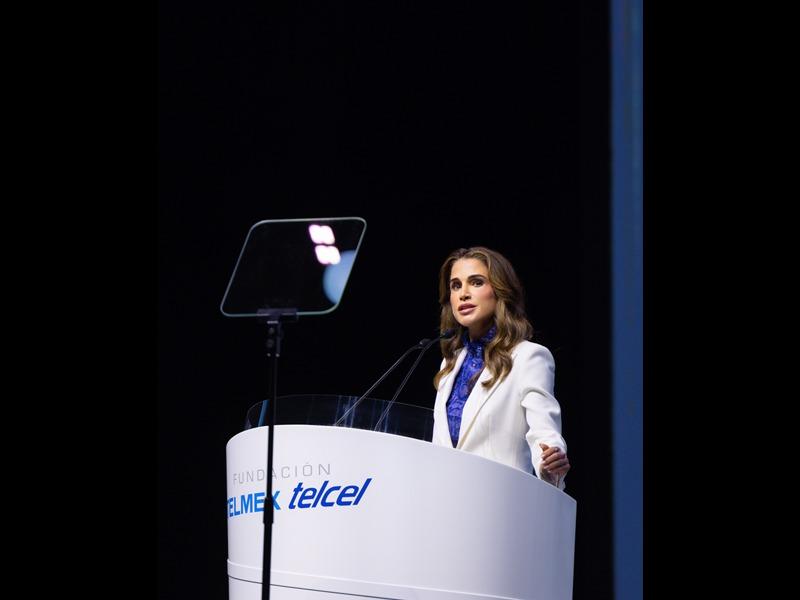Bismillah ar-Rahman ar-Rahim,
In the name of God, the Most Merciful, the Compassionate,
Thank you, Senator Amy Klobuchar, for those very kind words.
It’s a true honor to be here.
Like millions of Muslims, my day began before sunrise, with the first of our five daily prayers. Fajr — the dawn prayer — takes place before my first cup of coffee. And yet, it’s still my favorite time of day.
I think it’s because the dawn is a time in between. The sky holds no color and all colors. The day is empty, yet filled with possibility. And for a moment, we’re suspended between dark and light, between sleep and wakefulness, between contemplation and action.
For me, it’s a time that underscores the sacred that we find in the shades of grey... the beauty inherent in nuance and texture… the gift and grace of open minds and open hearts.
This moment stands in dismaying contrast with so much of what we’re seeing all around us.
No matter our faith or background, I think we can all agree that polarization is a defining feature of the day. The “in between,” the shades of grey, have been forced into black or white, saturating into their most extreme expression, losing any detail or dimension.
In this polarized environment, people feel increasingly obliged to commit to one side: left or right, in or out, for or against, idolize or cancel.
And, rather than spurring productive engagement, it’s forcing false political choices: either obsess over an issue or an outcome, or don’t bother caring at all.
The factors pushing us to the extremes have been exhaustively discussed. Globalization has left too many people behind. Migration has fueled a mindset of threat and scarcity. The pandemic permanently altered our sense of stability. And through it all, social media has narrowed our field of vision.
With so many storms, we seek security. One response is to cling to identity. And many have found religion to be a refuge — a safe place to hunker down.
But religion isn’t a shelter for hiding. It’s a launch pad for living. Whether we call ourselves Muslim, Christian, or Jewish, or however we identify, religion isn’t just about who we are, but what we do — and how we do it.
Religion is meant to help guide our way in the world. And it’s meant to help center our lives, to rejoice in the “in between”… the simple daily normalcies of everyday life, far away from the extremes.
In my faith, we constantly ask God to show us the right way — translated literally, to guide us to the straight path. In one day of prayer, Muslims ask God to guide us to the path at least 17 times… which, of course, is to admit 17 times every day that we need help to find it.
Today, I’d like to suggest that prayer — the defining practice of faith — can guide us all toward a better path… a path I’ll call the third way.
This third way is not the average of extremes, but rises above the binary, elevating us to higher ground that can become common ground as well.
To walk this path, we must recognize that none of us is wholly right or wrong, villain or victim, enlightened or in the dark. We each reflect our own blend of all these conditions… and still we are so much more than any one of them.
To walk this path, we must recognize that we don’t need to fight to secure our share of the pie, because the whole pie can be made bigger for everyone. The truth is that we live in a world of abundance. Our win doesn’t need to be someone else’s loss. And being right doesn’t mean that the other side is wrong — only that we need other points of view to see a multi-dimensional picture.
To walk this path means avoiding soundbites and embracing nuance. It means respecting science and research, data and detail. And when someone makes a claim that defies those things, whether online, in print, or behind a podium, it means we refuse to dignify it with our attention.
Rather than following those with the loudest voices, the third way requires us to pause and discern between fact and opinion, reject outrage-driven politics, and resist the temptation of sweeping labels.
I believe the third way has real stakes for our most pressing problems. If we chose it, we’d look out for working people and for our planet, knowing their fates are tied.
We’d recognize that global migration is a reality, and move on from trying to suppress human movement to managing it, but with compassion.
And we’d embrace the potential of breakthrough technologies like Artificial Intelligence, while also ensuring that human empathy is coded into our future… A future that, once and for all, recognizes that discrimination based on skin color and ethnicity is not only morally reprehensible, but utterly ignorant and primitive.
The third way is the only path we can walk together, with our full selves, and without prejudice, polarization, or preconceived battle lines.
We won’t see it on a map, but prayer invites us to embody postures that we’ll need in order to find it, or forge it. If we are willing to adopt those postures, together we can pursue our third way.
The first posture is humility.
In Islam, when we pray, we bow. So, every morning, and throughout the day, we kneel and press our foreheads to the ground.
When we lay ourselves down, we restore our sense of scale. We accept that our power and perspective are small. And when we see ourselves more clearly, we can see others more clearly, too.
Ultimately, it’s not the strength of our opponents we should focus on, but their vulnerability: the emotions of fear and anxiety behind even the most seemingly backward positions.
The Quran, the Hebrew Bible, and the Gospels all instruct us to “walk humbly.” And when we walk humbly, a new path opens before us.
Instead of seeing a foreigner as a threat, we can recognize our shared fragility. Instead of being angry at those with different perspectives, we can see the stories of loss and pain that underlie their beliefs. And instead of harboring grudges against those who offend us, we can acknowledge our own need for forgiveness — and choose to forgive them, too.
Humility reminds us that our insight is finite, our lives are fleeting, and we are flawed… and that the same is true for all of humankind.
Our shared condition leads me to the second posture of prayer: unity.
No matter where we are in the world, all Muslims face the same direction when we pray: the city of Mecca, and more specifically, the Kaaba, the most sacred site in our faith. I’ve been blessed with the opportunity to go there and perform the Islamic pilgrimage of Hajj.
At Hajj, over 2 million Muslims journey to Mecca each year and walk around the Kaaba seven times. It is the world’s largest annual human gathering.
From above, it would look like a whirlpool of white, with every other color marbled in. And if you zoomed in, you would see worshippers rich and poor, strong and feeble, distinguished and downtrodden, all walking shoulder to shoulder, equals before God.
Each time I make this journey around the Kaaba — the same journey as countless pilgrims before me and countless to come after me — I find myself weeping as I walk, overwhelmed to be part of a story so much bigger than myself.
But let me be clear: to seek unity is not to demand sameness.
The Quran teaches us that we are made with differences of gender, nation, and tribe “so that we might get to know one another.” You heard that right: difference for the sake of relationship. Diversity for the sake of community.
Unity is what helps us zoom out and see that we’re all circling the same desires: safety, belonging, a future for our children. Unity may not always be as easy to pinpoint as the Kaaba. But like planets orbiting the sun, we are always joined by a force at our center, if only we trust in its gravity.
The last posture we need to adopt is hope — which is inherent in the act of prayer itself.
When Muslims gather for Friday prayer in mosques, the Imam attests that God will remember and respond to us. In the Amidah, Jews say that God heals the sick and releases the imprisoned. In the Lord’s Prayer, Christians say that God’s kingdom will come on earth as it is in heaven.
These are not delusional descriptions of our world as it is today; they are fervent hopes for its future. Hope that things can be better than they are. That each new dawn is our chance to make it so.
I’ve learned a lot about hope from people who seem to have the least reason for it.
There are millions of refugees in my country. And they have embodied hope at every turn: When they packed their bags… when they fled by foot… when they made a new home in an unfamiliar place… when they, who had almost nothing, still found ways to share everything — food, laughter, music, and love.
In their voices, I hear the voices of scripture: Moses… Jesus… Muhammad, peace be upon them — people who called out injustice and in the same breath, offered hope.
They, too, were forced from their homes, fleeing violence and persecution at some point in their lives. And yet, they proclaimed hope. Not hope as an add-on to sweeten a bad deal, not hope as a cushion to soften the blow of reality, but hope as a truth just as durable as hardship. An appeal to us all to keep trying.
The United States has long been a landmark of hope — a shining city on a hill. Obviously, I am not an American, but I say that as someone who cares deeply about this country… who has long admired the values that inspire the U.S. at its best.
At its best, this country has embraced outsiders, recognizing that diversity enriches everyone.
At its best, this country has been generous with compassion, ready to lend a helping hand to those in need.
At its best, this country's gift for innovation has sparked growth and opportunity.
Polarization has pulled so many away from the values at the core of this country; values that others around the world look up to. In doing so, it has fractured friendships, families, and entire communities.
I believe Americans know how much healing is required for this country to be its best self. But God can guide the way back to those values, and, together, our world can find its way forward.
For, in the end, humility, unity, and hope are not our destination. They enable us to find the third way. And make no mistake: we will stumble from the path. But we always have the chance to return.
We may return on a prayer mat or at the communion table. In a synagogue, a temple, or in the privacy of our home. Walking in nature, or in a simple moment of quiet contemplation.
These practices can feel like five- or ten-minute breaks from the world. But truly, we need the values of prayer to break into the rest of our lives and the rest of the world — to impress on our hearts over and over the surprising truths of the universe: That there is dignity in humility, and power in surrender… that we find freedom in forgiveness… and that we can only truly find ourselves by giving ourselves to the service of others.
Islam calls it Islah — reform of ourselves, our relationships, and our society; Christianity calls it seeking the kingdom… different names for the same responsibility to love our neighbor — a love as real as bread to a hungry child, care for a sick widow, and a roof over the head of a refugee.
The dawn looks different from every point on earth, but the same sky reaches over us all.
Friends of all nations: May God show us the path, and may we walk that shared path side by side.
Thank you.


